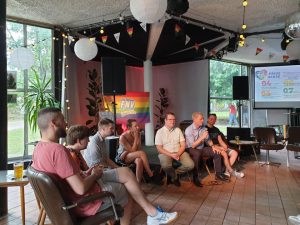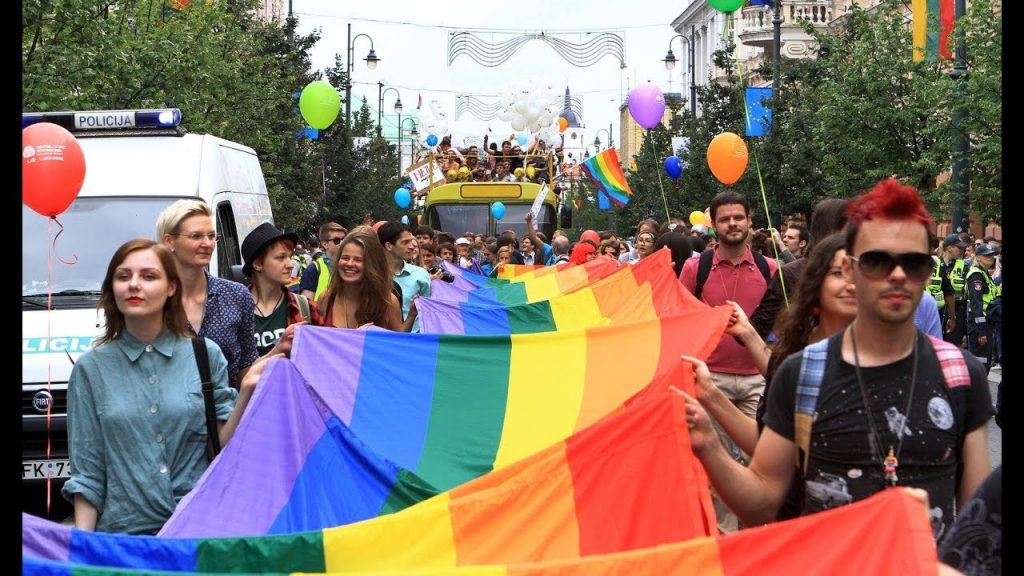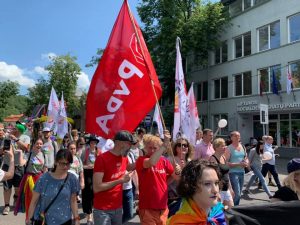This summer there were quite a few gay prides on the events calendar in the Netherlands. It involved major events such as Pink Monday & Saturday and of course the Amsterdam Pride with the famous boat parade. But there were also other pride events from Haarlem to Zwolle and even in my hometown of Geldrop.
Some people are bothered by that. “Why is this necessary, there is no straight pride either?” Those people could have traveled to the Baltic Pride with me this year in Vilnius, Lithuania. Together with the FNV Pink Network and the local 1 May Trade Union (G1PS) I organized an open discussion about LGBTI rights in the workplace.
The situation for LGBTI people is considerably different in Lithuania than in the Netherlands. In the Netherlands you can be yourself mostly, although still then two women or men walking hand in hand in the streets may be spit at or even beaten. You can’t be yourself in Lithuania. LGBTI people are not accepted in society. That goes very far. If people at work discover that you are LGBTI, there is a big chance that you will be fired. Even at a progressive institute such as a university. You can imagine what that does to a person. You cannot be yourself and you are always afraid that someone will discover who you truly are.

In the discussion about LGBTI rights in the workplace, most people listened in the background. A handful of people participated in the discussion. The conversation went smoothly, with words and pauses to let things sink in. With our Dutch background the representation of the FNV and I had to gradually adjust the approach that we had beforehand. Simply giving some tips on “how it works in the Netherlands” clearly did not work. Listening and trying to understand, that’s what it was all about.
It was a first time that a public talk was held in Lithuania on LGBTI rights in the workplace. Participants could have their say, which perhaps worked as a relief. It created a little more awareness and made people think about it. During the celebration of the Baltic Pride in Vilnius a number of people approached me to tell me that. They thought this opening was a good first step.
But how to move on? In the discussion we came to a number of points that could improve the situation. Collaboration between LGBTI movements and other emancipation organizations is important. Trade unions can also play a crucial role in this. The 1 May trade union is already working on this and they are also trying to get the big trade unions on board. In addition, cooperation across national borders reinforces the situation of LGBTI people and of course political legislation. Yet the real improvement starts somewhere else.
The most important conclusion was; show who you are. Visibility is key to acceptance. You can do that better as a group, because together you are strong. This is the clearest way to show your neighbours, colleagues, friends and acquaintances the existence of LGBTI people in society. That we are just people who are part of society and are really no different.
That point also affects the importance of prides. Show that you are there and show who you are. Celebrate who you are. Every gay pride is a protest against discrimination and a fight for acceptance. This also answers the question why there is no hetero pride; you will not be fired or spit at because you are straight.
And there is still plenty of work to be done everywhere. The first pride took place in Bosnia and Herzegovina last weekend. This went well and in a good atmosphere. I hope we will see a lot of other new prides in 2020. In this way, together we ensure, step by step, that people everywhere can be themselves.
Richard van de Burgt, fractievoorzitter PvdA Geldrop-Mierlo


